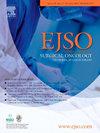Celiac ganglion resection as an intraoperative factor associated with delayed gastric emptying in retroperitoneal sarcoma surgery: A multicentric prospective cohort study
IF 3.5
2区 医学
Q2 ONCOLOGY
引用次数: 0
Abstract
Introduction
Delayed gastric emptying (DGE) is a common but underexplored complication following retroperitoneal sarcoma surgery. The celiac ganglion, often excised during these procedures, plays a key role in gastric motility and its removal may contribute to DGE development.
Materials and methods
Data from 42 patients were prospectively collected at three referral centers. DGE was graded according to the International Study Group of Pancreatic Surgery (ISGPS) classification. Intraoperative celiac ganglion resection was categorized as none, partial, or complete. The primary endpoint was the effect of celiac ganglion resection on clinically relevant DGE (ISGPS grade B–C). The secondary endpoint was whether resection was an independent predictor of DGE.
Results
One patient was excluded due to early postoperative mortality. Among the remaining 41 patients, DGE occurred in 60.97 % of cases, with 26.83 % classified as clinically relevant. Partial celiac ganglion resection was performed in 31.7 % of patients, while complete resection occurred in 14.6 %. Univariate analysis showed that complete resection was associated with 22.5-fold increased risk of clinically relevant DGE (p = 0.011). Multivariate analysis confirmed this association, identifying complete resection as an independent risk factor (OR = 40.56, p = 0.013).
Conclusions
Clinically relevant DGE is frequent after retroperitoneal sarcoma surgery. Complete celiac ganglion resection significantly increases the risk of DGE, emphasizing the importance of careful surgical planning and comprehensive preoperative patient counselling. Implementing standardized perioperative protocols, including early nutritional support, may help mitigate its impact and improve postoperative recovery.
腹膜后肉瘤手术中腹腔神经节切除与胃排空延迟相关:一项多中心前瞻性队列研究
胃排空延迟(DGE)是腹膜后肉瘤手术后常见但未被充分研究的并发症。在这些手术中经常切除的腹腔神经节在胃运动中起关键作用,其切除可能有助于DGE的发展。材料和方法前瞻性地收集了来自3个转诊中心的42例患者的数据。DGE根据国际胰腺外科研究小组(ISGPS)分级进行分级。术中腹腔神经节切除分为不切除、部分切除和完全切除。主要终点是腹腔神经节切除术对临床相关DGE的影响(ISGPS分级B-C)。次要终点是切除是否是DGE的独立预测因子。结果1例患者因术后早期死亡被排除。在其余41例患者中,DGE发生率为60.97%,其中26.83%归为临床相关。31.7%的患者行部分腹腔神经节切除,14.6%的患者行完全切除。单因素分析显示,完全切除与临床相关DGE风险增加22.5倍相关(p = 0.011)。多因素分析证实了这种关联,确定完全切除是独立的危险因素(OR = 40.56, p = 0.013)。结论腹膜后肉瘤术后常见临床相关DGE。腹腔神经节完全切除明显增加DGE的风险,强调仔细的手术计划和全面的术前患者咨询的重要性。实施标准化的围手术期方案,包括早期营养支持,可能有助于减轻其影响并改善术后恢复。
本文章由计算机程序翻译,如有差异,请以英文原文为准。
求助全文
约1分钟内获得全文
求助全文
来源期刊

Ejso
医学-外科
CiteScore
6.40
自引率
2.60%
发文量
1148
审稿时长
41 days
期刊介绍:
JSO - European Journal of Surgical Oncology ("the Journal of Cancer Surgery") is the Official Journal of the European Society of Surgical Oncology and BASO ~ the Association for Cancer Surgery.
The EJSO aims to advance surgical oncology research and practice through the publication of original research articles, review articles, editorials, debates and correspondence.
 求助内容:
求助内容: 应助结果提醒方式:
应助结果提醒方式:


